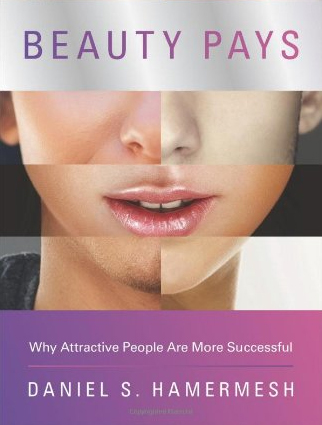From Q on CBC, and as mentioned in class:
We've all heard the expression that a beautiful girl can get away with murder, and we all know this is hyperbole (or perhaps a rumour started by an ugly person). But according to a new book, there is statistical evidence that the best-looking people receive all kinds of perks not bestowed upon plain Janes and average Joes.
In Beauty Pays, economist Daniel Hamermesh cites research that suggests beautiful people tend to do better than their aesthetically-challenged counterparts. They get bigger paycheques, better terms on mortgages, more glamorous or wealthy spouses and much more.
This beauty bias is even present in professions where physical attractiveness isn't thought to be a factor in someone's job. For example, Hamermesh looked at NFL quarterbacks and found that players considered to be the best-looking made more money through endorsements and salary than less attractive players of the same position, even though one would think that an athlete's compensation should be dictated purely by performance on the field.
Hamermesh said this effect is also evident in his own line of work: teaching economics at the University of Texas. "The better-looking professors get better evaluations from their students, which is not good for me," he said in a recent interview with Q.
But isn't beauty in the eye of the beholder? How do we, as a society, decide who is attractive? Hamermesh says scientists still don't exactly know what makes someone beautiful (facial symmetry is just a part of it), but noted that although beauty may be subjective, people tend to agree on what a good-looking face is.
"It doesn't matter that it's subjective if we all tend to look at it quite similarly. If I give you a scale, you rank people on a five-to-one scale, and you rate somebody a five, I'd be happy to bet, and I've seen this in studies I and others have done, that if you rate somebody a five, probably nine out of 10 other people will rate that person a four or a five...We tend to agree, we have standards of beauty even though we can't define it."
So what can be done to level the playing field for people who didn't luck out in the genetic lottery? Plastic surgery or head-to-toe makeovers are options, but Hamermesh says studies have shown that those changes make little difference to one's overall beauty. Instead, the professor has offered a radical suggestion: anti-discrimination laws to protect society's ugliest.
"I don't see it as being logically any different from things we now worry about protecting," he said, saying that employment laws protect people with disabilities from being passed over for jobs or promotions unfairly.
"One could argue for the same thing, that employers cannot exhibit patterns of only hiring the good looking or only promoting the good looking."
Listen to the interview with Dr. Hamermesh here.
